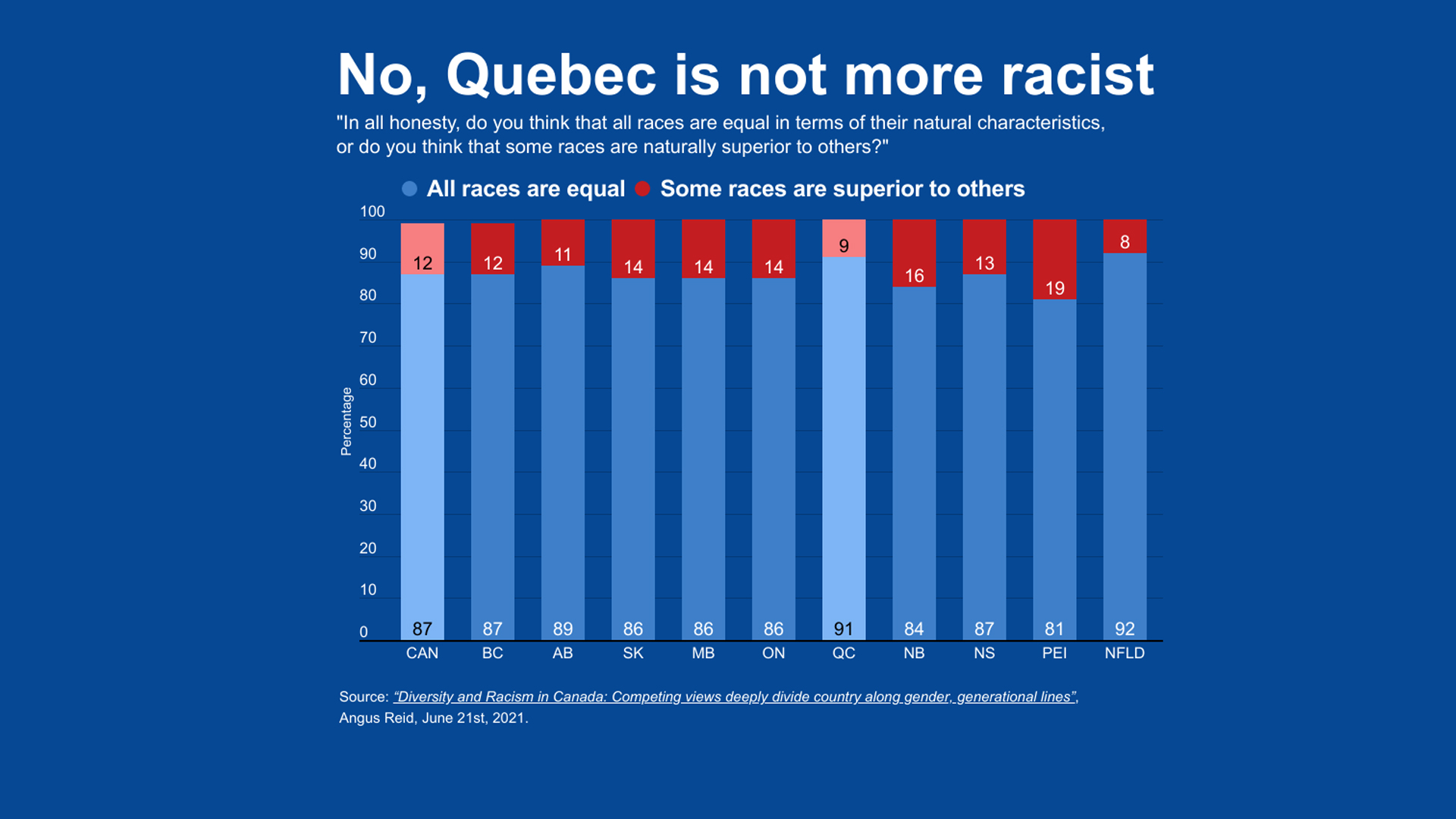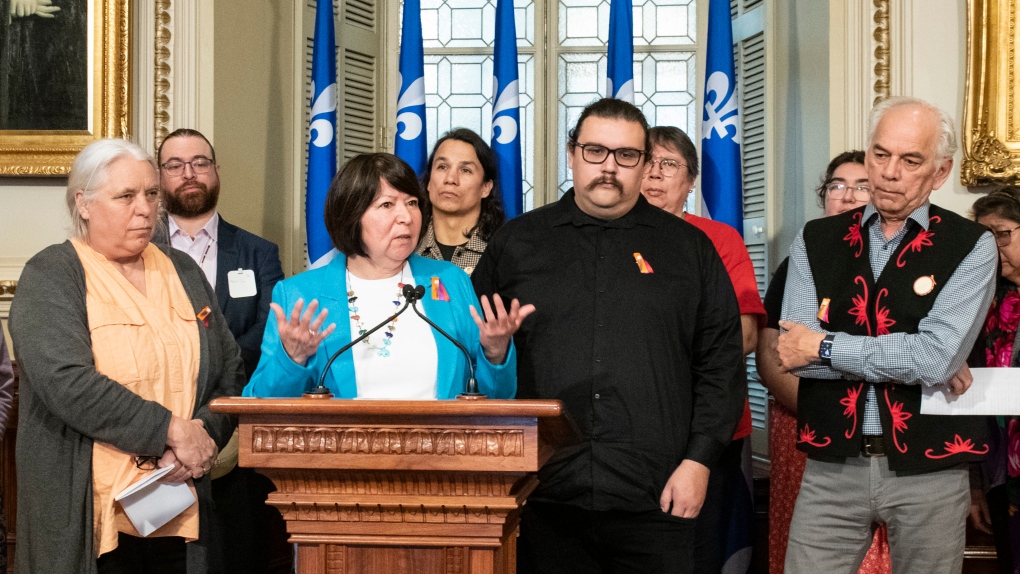Is Quebec Racist? Is Canada?

The number is nine. That’s the percentage of Quebecers who believe some races are superior to others. They, along with other Canadians, were asked this straightforward question by the Angus Reid Institute and the University of British Columbia in 2021: “In all honesty, do you think that all races are equal in terms of their natural characteristics, or do you think that some races are naturally superior to others?”Nine per cent may seem high, but compare it to Ontario, Saskatchewan and Manitoba with a rate of 14 per cent. There is a spike of 19 per cent in PEI (this may be a sampling error) and lows of 11 per cent in Alberta and eight per cent in Newfoundland and Labrador.Interestingly, one finds that 13 per cent of Indigenous people believe in the inequality of races and 18 per cent of non-Caucasian/non-Indigenous – double the Quebec number.How can we possibly square this result with the mere existence of Quebec’s secularism law, known as Bill 21, and the apparent consensus outside Quebec that citizens there are closed-minded? The answer, as Justin Trudeau explained the other day, is Quebecers relation to religion, especially with the misogynistic aspects of the Catholic religion of yesteryear and, these days, Islam.That is why this same Angus Reid Institute poll found what every other poll will tell you: a much bigger slice of Quebec opinion has negative views of religions as a whole and of Islam in particular. Angus Reid reports that whereas 25 per cent of all Canadians feel “cold” towards Muslims, the chill reaches 37 per cent in Quebec. Still in minority territory (63 per cent feel warm towards them) but a significant difference.Since support for the secularism bill, which bans the wearing of all religious signs for civil servants in authority, hovers around 65 per cent, there are simply not enough Quebecers who dislike Muslims to account for that great a number. Clearly, other variables are at play and racism is not one of them.In fact, Canadian pollsters regularly find Quebecers more tolerant on a range of issues than other Canadians. Ekos found in 2019 that 30 per cent of Quebecers believed there were too many members of visible minorities among immigrants. That is awful. But this level rose to 46 per cent in Ontario and 56 per cent in Alberta. And among visible minorities, 43 per cent felt there were too many visible minorities among immigrants. In short, Quebecers were less intolerant of immigrants of colour than Canadians as a whole and citizens of color themselves.
 |
| Demonstrators in Montreal hold signs in April 2019 protesting Bill 21, legislation to ban some public workers from wearing religious items. (Graham Hughes/AP) |
Polling from the Angus Reid Institute on Canadian perceptions of religions has produced some interesting results. Canadians don't think of themselves as racist. After all, Canada welcomes immigrants. The current government, like previous ones, welcomes an average of 350,000 and more immigrants to Canada annually. That's a staggering population growth over the course of decades. Not to mention the intake of tens of thousands of refugees. And they come from all corners of the world.
Canada's cities can hardly be recognized from the mono-white that was common fifty years ago. The most populous city in the country is now a rainbow of colours and a cornucopia of languages, cultures, ethnicities, heritage. Most Canadians accept the presence of neighbours who don't resemble themselves. Discrimination exists everywhere, but in the social mileau of Canada where generations ago it was prevalent, it has receded as people understand with the presence of others that they're pretty much alike.
The polling results have not been kind to Quebec, showing that they seem to be less tolerant of differences in religions. However, it is all religions; Quebec became secular and irreligious in the Silent Revolution when it threw off the restraints and shackles of the Catholic Church that at one time dominated Quebec life. Quebec in fact, models itself after France. So religious symbols of meaning to many faiths fail to make an impressive impact in Quebec.
The polling demonstrated Quebecers' deep skepticism of Islam with 52 percent feeling unfavourably disposed toward the religion; a majority matched in no other province, although 41 percent of Albertans and 44 pereant of Saskatchewanians have similar perceptions. If we were to look deeply into those perceptions they likely have their root in the impression that political Islamism with its jihadist agenda and terrorism wrought.
Quebec is also home to skepticism about Judaism where 32 percent of Quebecers hold unfavourable views compared to 16 percent in the rest of Canada. Only British Columbia, Atlantic Canada and Manitoba tend to be 18 percent unfavourable to Judaism. But it is Quebec that stands out as the only province that has taken to passing a law that bans the wearing of religious symbols among public servants in emphasis of its secularism of the state in separation of church and state.
Other religions do not fare quite as badly as Islam and Judaism; Quebecers holding a 19 percent unfavourable view of Buddhism in comparison to the rest of the country at 13 percent in Alberta, Ontario and Atlantic Canada, with 11 percent unfavourability in British Columbia. Outside Quebec 18 percent of Canadians hold unfavourable opinions on Hinduism compared to 25 percent of Quebecers. As for Sikhism, 32 percent of Quebecers and 22 percent of the rest of the country hold unfavourable opinions.
Christianity comes under fire in Quebec at 37 percent, with British Columbia almost as high at 35 percent, declining from Atlantic Canada, Alberta, Manitoba, and Saskathewan. Overall, Canadians, including Quebecers are most skeptical of Islam in comparison to other religions. Yet the bulk of hate crimes in Canada -- according to Statistics Canada -- are directed toward Jewish people with police reporting 320 hate crimes against Jewish people in 2020, followed by a total of 80 against Muslims and 40 against other groups combined.
When a co-worker wears a Star of David, 81 percent of Quebecers are comfortable, compared to 93 percent elsewhere in Canada; 75 percent of Quebecers are fine with the wearing of a kippa (skullcap) in comparison to 92 percent of the rest of the country. Polling notes that Quebec shows "a unique aversion to the Jewish kippa not noted elsewhere in the country".
Judaism and Hinduism reflect 55 percent of Quebecers comfortable with their child marrying into that religion, compared to 73 percent and 63 percent respectively for the rest of the country. Just 65 percent of Quebecers feel comfortable with a colleague wearing a hijab in comparison to 84 percent of the rest of Canada. Still, religious marriages see 38 percent of Quebecers feel all right for their child to marry a Muslim whereas in the rest of the country it averages 52 percent.
 |
| President of QNW Marjolaine Etienne speaks at a news conference after a petition calling on the Quebec government to recognize the existence of systemic racism and discrimination was tabled, at the legislature in Quebec City, Thursday, March 16, 2023. Quebec Solidaire co-spokesperson Manon Masse, far left, and Chief of the AFNQL, Ghislain Picard, far right, look on. THE CANADIAN PRESS/Karoline Boucher. |

<< Home